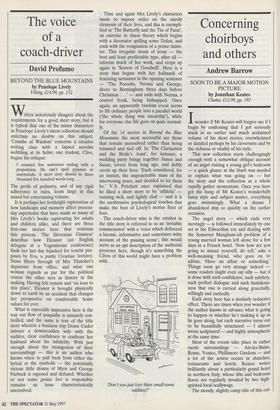The voice of a coach-driver
David Profumo
BEYOND THE BLUE MOUNTAINS by Penelope Lively Vikin& £14.99, pp. 152 Writers notoriously disagree about the requirements for a good short story, but it is typical that one of the minor characters in Penelope Lively's latest collection should entertain no doubts on this subject. `Crumbs of Wisdom' concerns a creative writing class with a lapsed novelist wobbling at its helm; one student, Clive, begins his critique: I counted five sentences ending with a preposition. He can't spell pyjamas or marmalade. A short story should be three thousand five hundred words long . . ..
The perils of pedantry, and of any rigid adherence to rules, loom large in this mixed but entertaining volume.
It is perhaps her forthright exploration of how landscape and memory affect present- day experience that have made so many of Mrs Lively's books captivating for adults and children alike, and there are three first-rate stories here that continue this process. 'The Slovenian Giantess' describes how Eleanor (an English delegate at a Yugoslavian conference) finds her last day hijacked for tourist pur- poses by Eva, a pushy Croatian lecturer. News filters through of Mrs Thatcher's departure from office, and what one woman regards as par for the political course the other sees as history in the making. Having felt remote and 'on loan to this place', Eleanor is brought physically down to earth by an accident that changes her perspective on comfortable home values for ever.
What is especially impressive here is the way our flow of sympathy is minutely con- trolled, and the same is true of the title story wherein a business trip Down Under imbues a downtrodden wife with the sudden, clear confidence to confront her husband about his infidelity. With just enough about the strangeness of their surroundings — this is an author who knows when to pull back from either the lyrical or the symbolic — the potentially vicious little drama of Myra and George Purbeck is exposed and defused. Whether or not some genius loci is responsible remains an issue characteristically unresolved. Time and again Mrs Lively's characters tussle to impose order on the unruly elements of their lives, and this is exempli- fied in 'The Butterfly and the Tin of Paint', an exercise in chaos theory which begins with a decorator spilling some Dulux, and ends with the resignation of a prime minis- ter. This irregular strain of irony — the best and least predictable type, after all informs much of her work, and crops up again in 'Season of Goodwill'. Here is a story that begins with her hallmark of featuring surnames in the opening sentence — 'The Pococks, Norma and George, drove to Birmingham three days before Christmas . . — and ends with Norma, a control freak, being kidnapped. Once again, an apparently random event seems to lift ordinary people into a parallel world (`the whole thing was unearthly'), while for everyone else life goes on quite normal- ly.
Of the 14 stories in Beyond the Blue Mountains the most successful are those that remain unresolved rather than being trimmed and tied off. In 'The Clarinettist and the Bride's Aunt', for instance, a wedding party brings together James and Susan, lovers from long ago, and deftly ravels up their lives: 'Each considered, for an instant, the impenetrable mass of the intervening years, and decided to let them be.' V. S. Pritchett once explained that he liked a short story to be 'athletic' running well, and lightly clad — and it is the unobtrusive psychological touches that make the best of Lively's stories fleet of foot.
The coach-driver who is the catalyst in the title story is referred to as an 'invisible commentator' with a 'voice which delivered a laconic, informative and sometimes witty account of the passing scene'; this would serve as an apt description of the authorial presence here, though it's something the Clives of this world might have a problem with.
Don't you just love these small-town oddities?'


































































 Previous page
Previous page